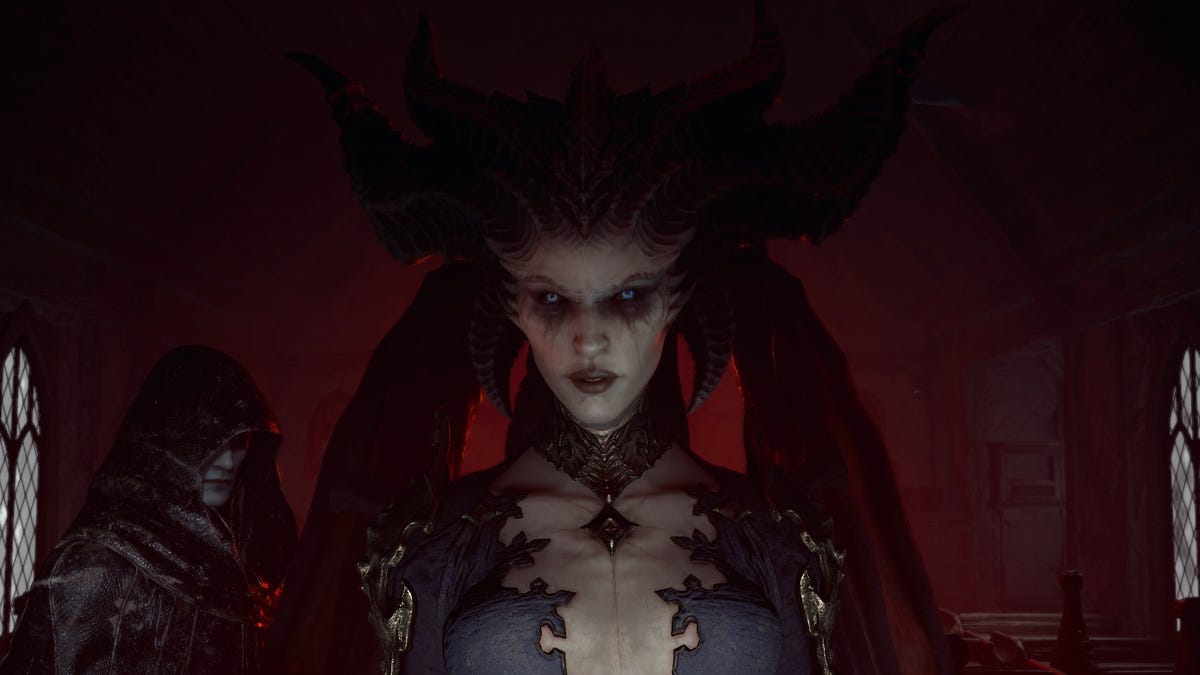Technologies
Diablo 4: Release Date, PC Specs and Everything to Know About the Darker Dungeon Crawler
From release date to PC requirements, here’s everything to know about the newest entry in the Diablo series.

Diablo 4, the latest installment of the popular dungeon crawler, is being released on June 6, and if the recent beta tests are any indication, it’s also going to be one of the best games of the year.
Diablo 4 puts players back into the bleak world of Sanctuary, where forces from heaven and hell manipulate humans to do their bidding. The Mother of Sanctuary, Lilith, has returned and intends to spread her evil across the world. It’s up to the players to take on her forces and stop her before it’s too late.
When does Diablo 4 come out?
It’s due out on June 6. Those who preordered the Deluxe or Ultimate edition of the game can start playing on June 1 at 4 p.m. PT.
What systems will Diablo 4 be available on?
Diablo 4 will be released on PC, PS4, PS5, Xbox One and Xbox Series X and S for $70.
What are the PC requirements for Diablo 4?
The minimum requirements are:
- Operating system: 64-bit Windows 10
- Processor: Intel Core i5-2500K or AMD FX-8350
- Memory: 8GB RAM
- Graphics: Nvidia GeForce GTX 660 or AMD Radeon R9 280
- Storage: Solid-state drive with 90GB available space
Publisher Blizzard recommends the following specs:
- Operating system: 64-bit Windows 10
- Processor: Intel Core i5-4670K or AMD R3-1300X
- Memory: 16GB RAM
- Graphics: Nvidia GeForce GTX 970 or AMD Radeon RX 470
- Storage: SSD with 90GB available space
What classes are available in Diablo 4?
There are five classes available in Diablo 4: Barbarian, Rogue, Sorcerer, Druid and Necromancer.
What’s the story in Diablo 4?
Diablo 4 is the newest entry in the legendary dungeon-crawling action RPG. Players will fight against the horde of monsters controlled by Lilith, the daughter of Mephisto, one of the Great Evils, and called the «mother» of Sanctuary, the world in which the Diablo series takes place.
Will Diablo 4 have microtransactions?
Yes it will, although Blizzard says they will only be used for cosmetic purposes.
How is it?
Diablo 4 is bigger and darker than previous games, which is a much-needed upgrade to its dungeon-crawler formula.
Sanctuary is split into large regions that are then divided into smaller zones. Zones generally have open areas filled with monsters, as well as different towns and encampments where players can interact with merchants or find side quests.
Quests in the game are abundant and will send you to the far reaches of Sanctuary. Some will require killing a number of enemies in the wild, while others are focused on taking down bosses found in dungeons.
Dungeons are scattered throughout the regions, some of which take a few minutes to clear, while others may take up to 15 minutes or more. There are also landmarks to discover and overworld events that will send waves of gruesome enemies your way.
Diablo 4 isn’t just bigger, it also has a far darker feel than previous games in the series. Time and time again, I was creeped out by the events unfolding in the game. Blizzard pushed the envelope in villainy by introducing Lilith, who entices individuals to let their inner demon out and do horrible things. The visuals in Diablo 4 help elevate the darker tone with cinematic sequences zooming in on the characters to give a close-up view of the horror rather than the distant viewpoint used throughout the game.
As remarkable as Diablo 4 is, the review build I experienced did have some issues that could frustrate players. I used the Necromancer during my time playing. It was great to have a gang of skeletons at my beck and call, but they tended to attack targets that posed no harm, like a destructible wall, while ignoring the boss I was fighting. Targeting itself can be a little cumbersome, especially from a distance, as auto-targeting doesn’t always pick the ideal enemy to attack. Some of my minions would also just stand there instead of attacking, but this was a rare occurrence.
Arguably the most frustrating aspect of playing the game was the lack of a basic attack button. For some reason, Blizzard felt it would be better to have players use a skill as the default attack. This means if I have a fancy sword or a giant scythe — I am playing a Necromancer after all — the default attack would be whatever initial skill I picked, instead of me swinging my weapon that I have equipped. It made having a cool weapon somewhat useless, which is almost sacrilegious for a game like Diablo, where the ultimate goal is to have the best-equipped character.
Diablo 4 does many things right to elevate the series. It offers a lot of content to keep players occupied for long periods of time, but it doesn’t do so without meaning. The game also returns to the dark tone of the original game but amplifies it for the modern audience.
Technologies
Today’s NYT Mini Crossword Answers for Saturday, Feb. 28
Here are the answers for The New York Times Mini Crossword for Feb. 28.

Looking for the most recent Mini Crossword answer? Click here for today’s Mini Crossword hints, as well as our daily answers and hints for The New York Times Wordle, Strands, Connections and Connections: Sports Edition puzzles.
Need some help with today’s Mini Crossword? As is usual for Saturday, it’s pretty long, and should take you longer than the normal Mini. A bunch of three-initial terms are used in this one. Read on for all the answers. And if you could use some hints and guidance for daily solving, check out our Mini Crossword tips.
If you’re looking for today’s Wordle, Connections, Connections: Sports Edition and Strands answers, you can visit CNET’s NYT puzzle hints page.
Read more: Tips and Tricks for Solving The New York Times Mini Crossword
Let’s get to those Mini Crossword clues and answers.
Mini across clues and answers
1A clue: Rock’s ___ Leppard
Answer: DEF
4A clue: Cry a river
Answer: SOB
7A clue: Clean Air Act org.
Answer: EPA
8A clue: Org. that pays the Bills?
Answer: NFL
9A clue: Nintendo console with motion sensors
Answer: WII
10A clue: ___-quoted (frequently said)
Answer: OFT
11A clue: With 13-Across, narrow gap between the underside of a house and the ground
Answer: CRAWL
13A clue: See 11-Across
Answer: SPACE
14A clue: Young lady
Answer: GAL
15A clue: Ooh and ___
Answer: AAH
17A clue: Sports org. for Scottie Scheffler
Answer: PGA
18A clue: «Hey, just an F.Y.I. …,» informally
Answer: PSA
19A clue: When doubled, nickname for singer Swift
Answer: TAY
20A clue: Socially timid
Answer: SHY
Mini down clues and answers
1D clue: Morning moisture
Answer: DEW
2D clue: «Game of Thrones» or Homer’s «Odyssey»
Answer: EPICSAGA
3D clue: Good sportsmanship
Answer: FAIRPLAY
4D clue: White mountain toppers
Answer: SNOWCAPS
5D clue: Unrestrained, as a dog at a park
Answer: OFFLEASH
6D clue: Sandwich that might be served «triple-decker»
Answer: BLT
12D clue: Common battery type
Answer: AA
14D clue: Chat___
Answer: GPT
16D clue: It’s for horses, in a classic joke punchline
Answer: HAY
Technologies
Ultrahuman Ring Pro Brings Better Battery Life, More Action and Analysis
The company’s new flagship smart ring stores more data, too. But that doesn’t really help Americans.

Sick of your smart ring’s battery not holding up? Ultrahuman’s new $479 Ring Pro smart ring, unveiled on Friday, offers up to 15 days of battery life on a single charge. The Ring Pro joins the company’s $349 Ring Air, which boosts health tracking, thanks to longer battery life, increased data storage, improved speed and accuracy and a new heart-rate sensing architecture. The ring works in conjunction with the latest Pro charging case.
Ultrahuman also launched its Jade AI, which can act as an agent based on analysis of current and historical health data. Jade can synthesize data from across the company’s products and is compatible with its Rings.
«With industry-leading hardware paired with Jade biointelligence AI, users can now take real-time actionable interventions towards their health than ever before,» said Mohit Kumar, CEO of Ultrahuman.
No US sales
That hardware isn’t available in the US, though, thanks to the ongoing ban on Ultrahuman’s Rings sales here, stemming from a patent dispute with its competitor, Oura Ring. It’s available for preorder now everywhere else and is slated to ship in March. Jade’s available globally.
Ultrahuman says the Ring Pro boosts battery life to about 15 days in Chill mode — up to 12 days in Turbo — compared to a maximum of six days for the Air. The Pro charger’s battery stores enough for another 45 days, which you top off with Qi-compatible wireless charging. In addition, the case incorporates locator technology via the app and a speaker, as well as usability features such as haptic notifications and a power LED.
The ring can also retain up to 250 days of data versus less than a week for the cheaper model. Ultrahuman redesigned the heart-rate sensor for better signal quality. An upgraded processor improves the accuracy of the local machine learning and overall speed.
It’s offered in gold, silver, black and titanium finishes, with available sizes ranging from 5 to 14.
Jade’s Deep Research Mode is the cross-ecosystem analysis feature, which aggregates data from Ring and Blood Vision and the company’s subscription services, Home and M1 CGM, to provide historical trends, offer current recommendations and flag potential issues, as well as trigger activities such as A-fib detection. Ultrahuman plans to expand its capabilities to include health-adjacent activities, such as ordering food.
Some new apps are also available for the company’s PowerPlug add-on platform, including capabilities such as tracking GLP-1 effects, snoring and respiratory analysis and migraine management tools.
Technologies
The FCC Just Approved Charter’s $34.5B Cox Purchase. Here’s What It Means for 37M Customers
-

 Technologies3 года ago
Technologies3 года agoTech Companies Need to Be Held Accountable for Security, Experts Say
-

 Technologies3 года ago
Technologies3 года agoBest Handheld Game Console in 2023
-

 Technologies3 года ago
Technologies3 года agoTighten Up Your VR Game With the Best Head Straps for Quest 2
-

 Technologies4 года ago
Technologies4 года agoBlack Friday 2021: The best deals on TVs, headphones, kitchenware, and more
-

 Technologies5 лет ago
Technologies5 лет agoGoogle to require vaccinations as Silicon Valley rethinks return-to-office policies
-

 Technologies5 лет ago
Technologies5 лет agoVerum, Wickr and Threema: next generation secured messengers
-

 Technologies4 года ago
Technologies4 года agoOlivia Harlan Dekker for Verum Messenger
-

 Technologies4 года ago
Technologies4 года agoiPhone 13 event: How to watch Apple’s big announcement tomorrow

